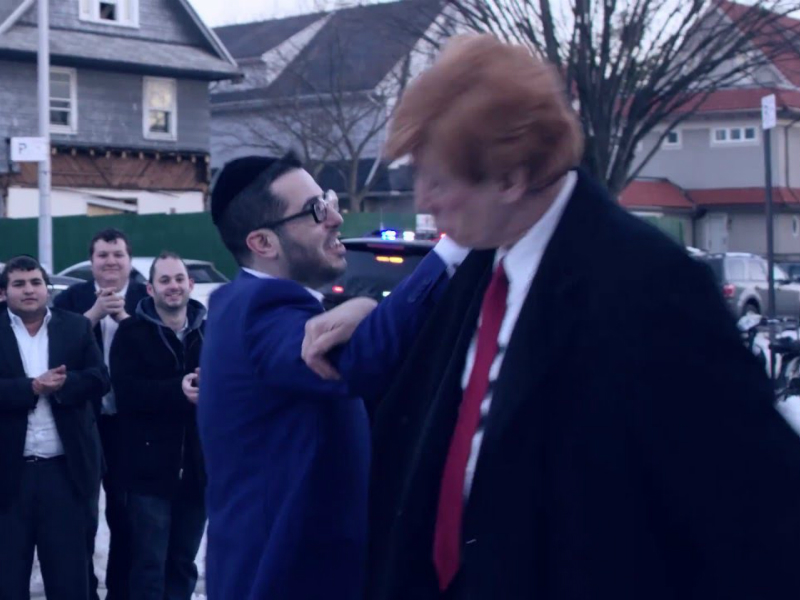It is not everyday that one sees a Donald Trump impersonator blowing a shofar and dancing with Orthodox Jews. No, this isn’t some sort of Jewish version of a Saturday Night Live skit. It is the setting for Mendy J’s hit Lubavitch music video, Harabi. The lyrics dart between Hebrew and English, and describe how Chabad houses are being built around the world to reconnect Jews to Judaism. The chorus: “We want Mashaich achshav (now)!”
One hopes they do not imply that Trump is indeed the Mashiach, although even this is open to some ambiguity.
The video is set in a New York clothing store, where Trump impersonator RJ Lewis dons a red “Make America Great Again” cap and browses approvingly through a selection of Lubavitch-style white shirts and black suits. “We are one of the first productions in the Jewish world to utilize product placement and branding,” explains Chananya Begun, Mendy J’s producer.
“We wanted to create a caricatured version of Trump and the whole world upside down during Purim,” adds Begun. “We tried to walk the line in the middle where we kind of made fun of Trump, so it can be perceived both ways, it can look like we are ridiculing him or endorsing him.”
The political vagueness of the video does not reflect the views of its creator. “We all voted for Trump,” explains Mendy Jacobson, aka Mendy J, 29, a rising star in the Lubavitch music scene. “He brought everyone together.
According to Pew Research, just 24 per cent of Jews voted for Trump, but indeed, the percentages among Orthodox Jews are much higher. Indeed, opinions on Trump have severely divided the Jewish community, arguably even more than positions on Israel or attitudes towards intermarriage.
Mendy J’s statement about Trump “bringing everyone together” could raise a few eyebrows among his colleagues in the world of American klezmer music, with its long history of leftist protest songs about feminism and workers rights that continues today with singer Daniel Kahn’s revival of a 1931 poem by Kurt Tucholsky called Embrace the Fascists, about the dangers of allowing a public forum for any form of hate speech.
READ: FROM YONI’S DESK: ON FACTS ALONE, TRUMP-NAZI ANALOGIES DON’T HOLD UP
A common rallying cry among most contemporary Yiddish performers is the use of protest songs in opposition to Trump. Issues like equating both sides at the Charlottesville neo-Nazi rally, and putting children of the undocumented in cages are “deal-breakers.”
Meanwhile, producer Begun, tries to explain the political leanings of the Orthodox community: “Trump may be old school in his perception of different things like Charlottesville … We trust him on what his goals are and if he’s a little shaky how he gets there, he isn’t a perfect person, but who is a perfect person?”
Trump is not at the centre of the “kosher pop” music world that tends to avoid politics and deals mostly with religious matters. Meanwhile, Mendy J collaborates with Begun’s organization, The Young Talent Initiative, designed for creative out-of-the-box Orthodox kids, teaching them vocal technique and social media skills. “If you don’t make it in the yeshivah system, boys often end up in the streets, disconnected from their roots and [end up taking] drugs,” explains Begun. “In the secular world, you have other institutions to cherish and respect other strengths for each kid. In our world, we don’t.”
At first glance, it seems that there lies a world apart between the leftist Kahn, who tirelessly reminds us of parallels between Trumpism and fascism, and Mendy J, who claims that Trump brings unity to Jews. But something has to be said for what they have in common: using music to fight injustice and repair the imperfections of the Jewish world, a task that will definitely outlive the divisions caused by Trump.
